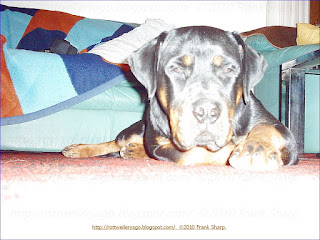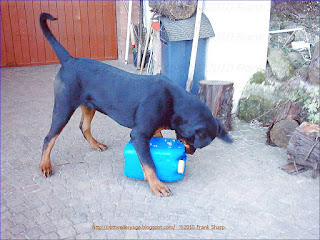








I'M NOW 8 MONTS OLD.
I'M GETTING BIGGER IN SIZE AND WEIGHT AND POWER OFCOURSE.
Deciding how much you need to feed your Rottweiler is very important for the health of your dog. Rottweilers are known for being overweight and even obese. Through proper diet and exercise you should be able to manage your dog’s weight safely.
Your Rottweiler puppy, while very small at the moment, will grow into a very large dog. A female Rottweiler will grow to weigh around 75 pounds to about 105 pounds. Male Rottweilers can be expected to be a bit larger than a female at around 110 pounds to about 130 pounds.
So even though your puppy is small now, it will grow up to be very large. And they grow quickly!
Your puppy’s nutrition is incredibly important while they are young so they can grow up to be strong and healthy. They are at risk for developing joint and bone problems, so feeding them highly nutritious food is the key to kick starting your Rottweiler into a long and healthy life. Feeding them dog foods that are holistic, all natural, and organic is a great start.
Rottweilers, and all dogs, are carnivores. That means they primarily eat meat. But when you look at a bag of dog food, you may find that the ingredients are primarily grains. This is because meat is expensive, and you can easily substitute meat with grains to cut down on the cost of manufacturing. Your dog should be consuming mainly meat in their diets to keep them healthy as well as to control their weight. Generally the cheaper the food, the more grains, preservatives, and chemicals are used in manufacturing. This does not always mean that the more expensive foods are necessarily better for your dog. Make sure you check the ingredients before making a decision on which dog food to purchase. But how can you tell which dog food is going to be the best fit for your Rottweiler?
The number one ingredient on your dogs food bag should be meat, or meat meal. The ingredients should say something like chicken, chicken meal, herring meal, turkey meal, etc. If you want to feed your dog a proper diet, you should never feed them food that contains produced meals, soy, wheat, or corn.
Your Rottweiler needs lots of protein in their diets. An adult Rottweiler should be served dog food that contains 22% to 26% protein, and a puppy should be served puppy food that contains 24% to 28% protein. A high protein diet will keep your Rottweiler from becoming overweight since the proteins are excreted through kidneys and not stored as fat. A puppy needs more protein in their diet because they are still growing and need the extra protein to develop muscles and build strength.
Your dogs food should contain only contain small amounts of fat and should never be listed anonymously as animal fat, but should appear as chicken fat, or beef fat. The healthy amount of fat content in your dog’s food should be around 12% to 16% for an adult Rottweiler, and 14% to 18% for a puppy. Just like with protein, puppies can consume a larger amount of fat than adults because they are still growing and have high energy. Fat does not equal substance anymore in a dog as it does in humans. If your Rottweiler eats foods high in fat, they will become overweight.
Your Rottweiler’s food should never contain chemical preservatives, sugar, or artificial color. There is zero nutritional value for a dog in any of these ingredients. They can even potentially be harmful to consume.











































